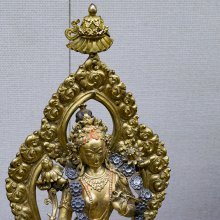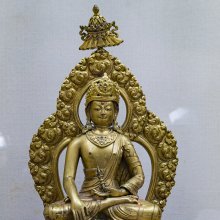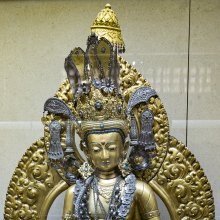Sagara, Sāgara, Sāgāra, Sāgarā: 50 definitions
Introduction:
Sagara means something in Buddhism, Pali, Hinduism, Sanskrit, Jainism, Prakrit, the history of ancient India, Marathi, Hindi, biology. If you want to know the exact meaning, history, etymology or English translation of this term then check out the descriptions on this page. Add your comment or reference to a book if you want to contribute to this summary article.
Sagara has 50 English definitions available.
Images (photo gallery)
Languages of India and abroad
Sanskrit dictionary
[Deutsch Wörterbuch]
Source: Cologne Digital Sanskrit Dictionaries: Böhtlingk and Roth Grosses Petersburger WörterbuchSagara (सगर):—
--- OR ---
Sagara (सगर):—2. adj.
1) nach Comm. (2. sa + gara von 1. gar) so v. a. von Lob begleitet: a.nayaḥ [Vājasaneyisaṃhitā 5, 34.] könnte auch gefrässig, im Frass begriffen (2. sa + gara von 2. gar) bedeuten. —
2) vergiftet, giftig [Bhāgavatapurāṇa 5, 26, 34.] vergiftete Speise [Rāmāyaṇa ed. Bomb. 1, 70, 31.]
--- OR ---
Sagara (सगर):—
--- OR ---
Sāgara (सागर):—(von 1. sagara)
1) m. a) das Meer [Śāntanācārya’s Phiṭsūtrāṇi 1, 2] (oxyt.). [Amarakoṣa 1, 2, 3, 1.] [Hemacandra’s Abhidhānacintāmaṇi 1073.] [Halāyudha 3, 30.] nach der Legende das von den Söhnen Sagara's ausgehöhlte Becken, welches Bhagīratha mit dem Wasser der Gaṅgā füllte, [Rāmāyaṇa 1, 5, 2.] [Rāmāyaṇa] [Gorresio 1, 45, 37.] [Viṣṇupurāṇa 379.] [Bhāgavatapurāṇa 9, 8, 4.] vgl. u. 1. sagara 2). [Manu’s Gesetzbuch 6, 90.] [CŪLIKOP.] in [Weber’s Indische Studien 9, 20.] sarasāmasmi sāgaraḥ sagt Kṛṣṇa [Bhagavadgītā 10, 24.] [Rāmāyaṇa 2, 23, 29.] [Suśruta 1, 264, 8.] [AṢṬĀV. 3, 3.] [Varāhamihira’s Bṛhajjātaka S. 5, 42. 12, 2.] [Naiṣadhacarita 22, 43.] dustara [Raghuvaṃśa 1, 2.] sāgarāmbhas [Mahābhārata 1, 1137.] [Spr. (II) 6995.] sāgaraṃ sumahadbaddhvā (vgl. u. mahant) [Rāmāyaṇa 6, 34, 14.] bandhana [Oxforder Handschriften 143,b, No. 295.] laṅghanamantra [344,a,13.] dhīracetas [Raghuvaṃśa 18, 3.] sāgarasya phenaḥ so v. a. samudraphena [Suśruta 2, 324, 4. 347, 8.] du. [Bhāgavatapurāṇa 8, 10, 15.] pl. [Manu’s Gesetzbuch 1, 24.] [Harivaṃśa 266.] [Rāmāyaṇa 1, 65, 12.] [Varāhamihira’s Bṛhajjātaka S. 48, 60.] catvāraḥ [Mahābhārata 6, 105.] [Rājataraṅgiṇī 3, 126.] sapta [Rāmāyaṇa 3, 77, 25.] saptasāgaradāna (sieben Urnen mit siebenfachem Inhalt den sieben Meeren entsprechend: vgl. unter samudra [Sp. 727, Z. 20]) [Oxforder Handschriften 43], a, [18. fg. 35], b, 10. Am Ende eines adj. comp. (f. ā) [NṚS. TĀP. Upakośā] in [Weber’s Indische Studien 9, 76.] [Mahābhārata 3, 13433. 7, 3900. 9, 1914.] [Raghuvaṃśa 1, 30. 11, 86. 18, 3.] [Mārkāṇḍeyapurāṇa 121, 2.] [WEBER, KṚṢṆAJ. 297.] [PAÑCAR. 1, 6, 34.] — b) das Meer als Bild der unübersehbaren Ausdehnung, der Unergründlichkeit und Gefährlichkeit: paṅka [Mārkāṇḍeyapurāṇa 43, 18.] saṃsāra [AṢṬĀV. 17, 9.] [WEBER, KṚṢṆAJ. 295.] cintā [Rāmāyaṇa 1, 9, 44.] śoka [2, 77, 13.] [Rāmāyaṇa Gorresio 2, 37, 22. 6, 95, 34.] [WEBER, KṚṢṆAJ. 265.] aniṣṭa [Spr. (II) 5808.] pāraṃ gataḥ sakaladarśanasāgarāṇām [SARVADARŚANAS. 1, 3.] vismṛti das Meer der Vergessenheit [Rājataraṅgiṇī 1, 83.] daitya so v. a. eine unübersehbare Anzahl von D. [Harivaṃśa 10626. 13101.] guṇa ein Meer von Vorzügen als Beiw. einer Person [Mahābhārata 3, 16762.] [Rāmāyaṇa] [Gorresio 2, 14, 19. 33, 12.] [ŚUK.] in [Lassen’s Anthologie (III) 32, 16.] sattva [Kathāsaritsāgara 58, 115.] saṃgītāgama [Dhūrtasamāgama 68, 15.] — c) Bez. der Zahl vier [GAṆIT.] [BHAGAṆĀDH. 5.] — d) Bez. einer best. hohen Zahl, = 10 Padma [Brahmāṇḍapurāṇa im Śabdakalpadruma] [Hemacandra’s Abhidhānacintāmaṇi 127.] — e) eine Gazellenart [Śabdacandrikā im Śabdakalpadruma] — f) pl. die Söhne Sagara's [Mahābhārata.3,8861.] [Rāmāyaṇa.1,41,7.] [Rāmāyaṇa] [Gorresio.1,43,12.2,21,32.] [Weber’s Verzeichniss No. 452.] [Oxforder Handschriften 10,a,11.] — g) Nomen proprium verschiedener Personen [Oxforder Handschriften 135,b, No. 255.] [Rājataraṅgiṇī.7,135.] [TĀRAN. 3. 267.] [Rgva tch’er rol pa ed. Calc. 201,10.] ein Nāgarāja [249, 13. 268, 7. 337, 2.] [Lot. de Lassen’s Anthologie b. l. 3. 160.] [Vyutpatti oder Mahāvyutpatti 41. 85.] der 3te Arhant der vergangenen Utsarpiṇī [Hemacandra’s Abhidhānacintāmaṇi 50.] — h) Name eines der zehn auf Schüler Śaṃkarācarya’s zurückgeführten Bettelorden, dessen Mitglieder das Wort sāgara ihrem Namen beifügen, [Oxforder Handschriften 227], b, [?16. WILSON, Sel.] Works [1, 202.] — i) Nomen proprium einer Oertlichkeit [Oxforder Handschriften 338], b, 36. — k) (abgekürzter) Titel eines Werkes ebend. 292, b, 31. fg.; vgl. adbhuta, tattva, dāna, smṛti . —
2) adj. (f. ī) marinus: tanu [Harivaṃśa 3005.] —
3) n. Nomen proprium einer Stadt [WASSILJEW 52. 205.] — Vgl. kṣīra, puṣkara, pūrva, buddhi, brahma, ratna, śruti .
Sanskrit, also spelled संस्कृतम् (saṃskṛtam), is an ancient language of India commonly seen as the grandmother of the Indo-European language family (even English!). Closely allied with Prakrit and Pali, Sanskrit is more exhaustive in both grammar and terms and has the most extensive collection of literature in the world, greatly surpassing its sister-languages Greek and Latin.
See also (Relevant definitions)
Partial matches: Gara, Sha, Ca.
Starts with (+107): Cakaraiyantu, Cakaram, Cakaranir, Cakarappirapai, Cakaratanam, Sagara Brahmadatta, Sagara-tata, Sagarabilu, Sagarabuddhi, Sagarabuddhidharin, Sagarabuddhidharyabhijnagupta, Sagaracakri, Sagaracandra, Sagaracandrakatha, Sagarachakri, Sagaradana, Sagaradatta, Sagaradattashreshthi, Sagaradattashreshthisambandha, Sagaradeva.
Ends with (+143): Acarasagara, Adbhutasagara, Adhisagara, Advaitanandasagara, Akampitasagara, Akkasagara, Amarasagara, Amritasagara, Anandarasasagara, Anandasagara, Anupavyavaharasagara, Arogyasagara, Attahasagara, Balasagara, Bhaktisagara, Bhavasagara, Bhumadhyasagara, Brahmasagara, Buddhica Sagara, Buddhisagara.
Full-text (+670): Sagaras, Sagaramekhala, Sagaragamini, Sagaranemi, Yadavi, Kesini, Sakaram, Upasagaram, Amshuman, Sumati, Sagaralaya, Sagaratva, Titirshu, Sagaranta, Sagarasunu, Sagarodaka, Sagaropama, Catuhsagarika, Saptasagara, Vipatsagara.
Relevant text
Search found 101 books and stories containing Sagara, Sāgara, Sāgāra, Sāgarā, Sa-gara; (plurals include: Sagaras, Sāgaras, Sāgāras, Sāgarās, garas). You can also click to the full overview containing English textual excerpts. Below are direct links for the most relevant articles:
The Brahmanda Purana (by G.V. Tagare)
Chapter 56 - The descent of Gaṅgā < [Section 3 - Upodghāta-pāda]
Chapter 53 - The destruction of the sons of Sagara < [Section 3 - Upodghāta-pāda]
Chapter 54 - Recovery of the Sacrificial Horse < [Section 3 - Upodghāta-pāda]
The Gautami Mahatmya (by G. P. Bhatt)
Sahitya-kaumudi by Baladeva Vidyabhushana (by Gaurapada Dāsa)
Text 1.1 < [Chapter 1 - The Purpose of Poetry]
Text 10.67 < [Chapter 10 - Ornaments of Meaning]
Text 10.272 < [Chapter 10 - Ornaments of Meaning]
Garga Samhita (English) (by Danavir Goswami)
Verse 4.9.13 < [Chapter 9 - The Glories of Srī Ekādaśī]
Verses 3.10.31-37 < [Chapter 10 - The Glory of Śrī Girirāja]
Verse 1.15.12 < [Chapter 15 - Revelation of the Universal Form to Nanda’s Wife]
Puranic encyclopaedia (by Vettam Mani)
Trishashti Shalaka Purusha Caritra (by Helen M. Johnson)
Part 6: Kapila as disciple < [Chapter I - Previous births of Mahāvīra]
Part 12: Life as a god < [Chapter I - Previous incarnation as Vimalavāhana]
Part 29: Śreyāṃsa’s mokṣa (emancipation) < [Chapter I - Śreyāṃsanāthacaritra]
Related products






